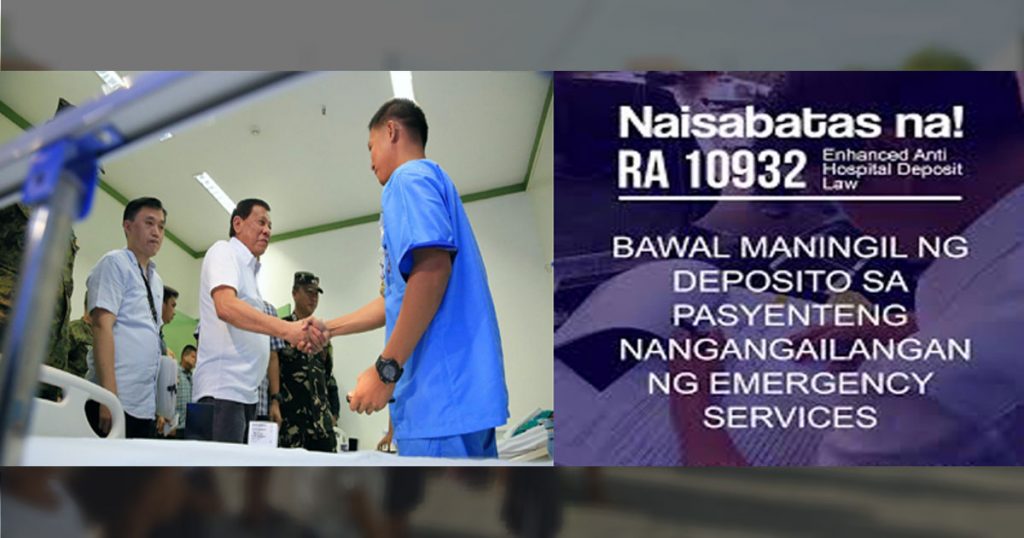With a number of emergency situations that made rounds on the internet recently wherein hospitals require down payments or decline to attend to a patient due to his/her incapacity to render deposit, it is indeed great to hear the recently approved law called the Anti-Hospital Deposit Law or RA 10932. This recent Republic Act prohibits the hospitals to demand an advance payment before providing basic emergency treatment to patients.
Over the past few years, a number of less-fortunate patients are complaining regarding the refusal of public hospitals to provide emergency services without deposit cash. A Department of Health (DOH) official reiterated that medical services should be available even without down payments or deposits to patients who need emergency treatments – both in private and public hospitals.
Assistant Secretary Elmer Punzalan said during an interview that government hospitals should not require the patients to give deposits first before they provide emergency medical treatment and private hospitals, on the other hand, should refer the patients to government hospitals, if necessary.
The Anti-Hospital Deposit Law makes it unlawful for medical clinics and hospitals – both in private and public – to solicit, request, accept or demand a deposit or other form of advance payment as a requirement or prerequisite before administering basic emergency care, for emergency medical treatment or confinement. Moreover, it also prohibits any hospital or medical clinic to refuse to provide medical support and treatment to any patient.
Under RA 10932, any medical practitioner, official or employee of the medical clinic or hospital who violates the provisions of the Anti-Hospital Deposit Law could face some sanctions and penalties such as:
- Not less than 6 months and 1 day of imprisonment; but not more than 2 years and 4 months
- A fine of not less than Php100k but not more than Php300k; or both
Those officers or directors of clinics or hospitals who will violate the provisions of RA 10932 is punishable by:
- 4-6 years of imprisonment
- A fine of Php500k but not more than Php1million
In addition to the penalties mentioned above, the Department of Health has the right to revoke the license of a medical facility to operate if 3 repeated violations of the Anti-Hospital Deposit Law have been committed, as stated in the said Act. Furthermore, there will be an underlying liability against the hospital, medical clinic, director, officials, medical practitioner or hospital employee involved in the death, permanent disability, serious impairment of the patient. The same thing goes for those involved permanent injury or loss of an unborn child to a pregnant woman as a result of denial or refusal to admit her to the health facility.
The Anti-Hospital Law has been supported by a lot of people who seeks to make health care highly accessible to every Filipino but a number of private hospitals slam it due to some reasons of inadequacy such as their medical supplies and stock can’t be replenished right away and the services of the medical professionals would not have guaranteed compensation. No matter their reasons are – RA 10932 is a good news to all less-fortunate Filipino patients.


Leave a Reply